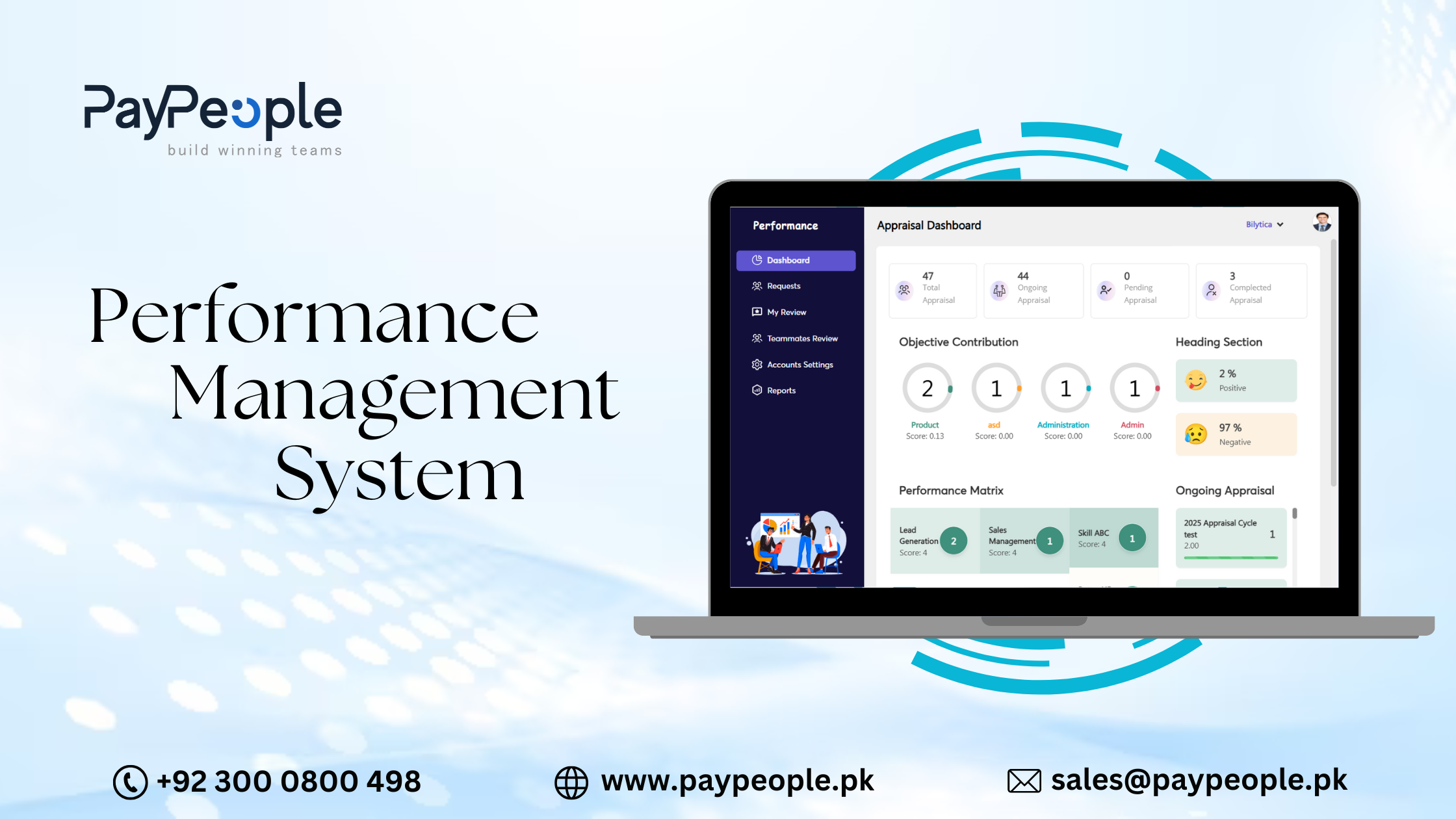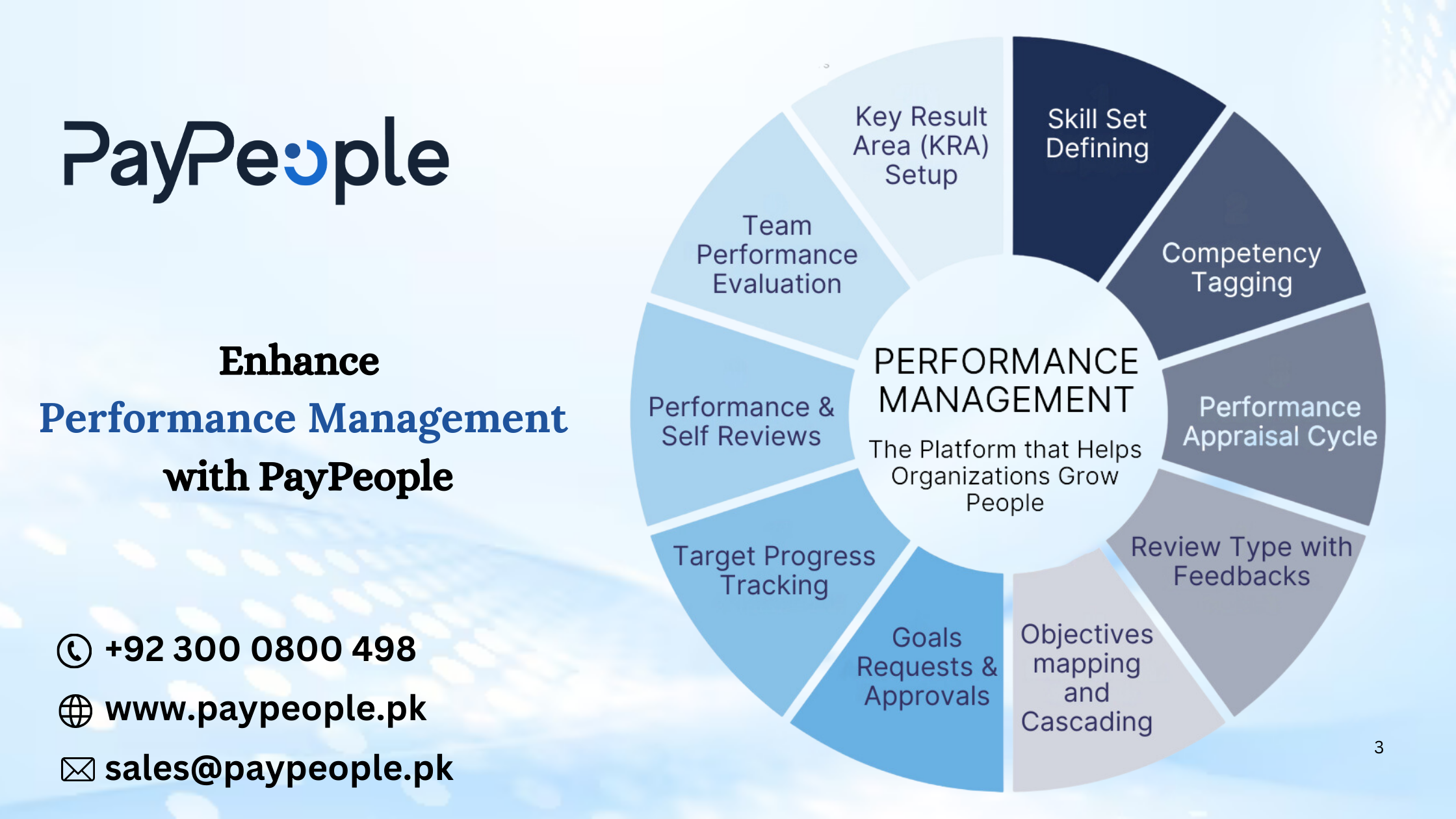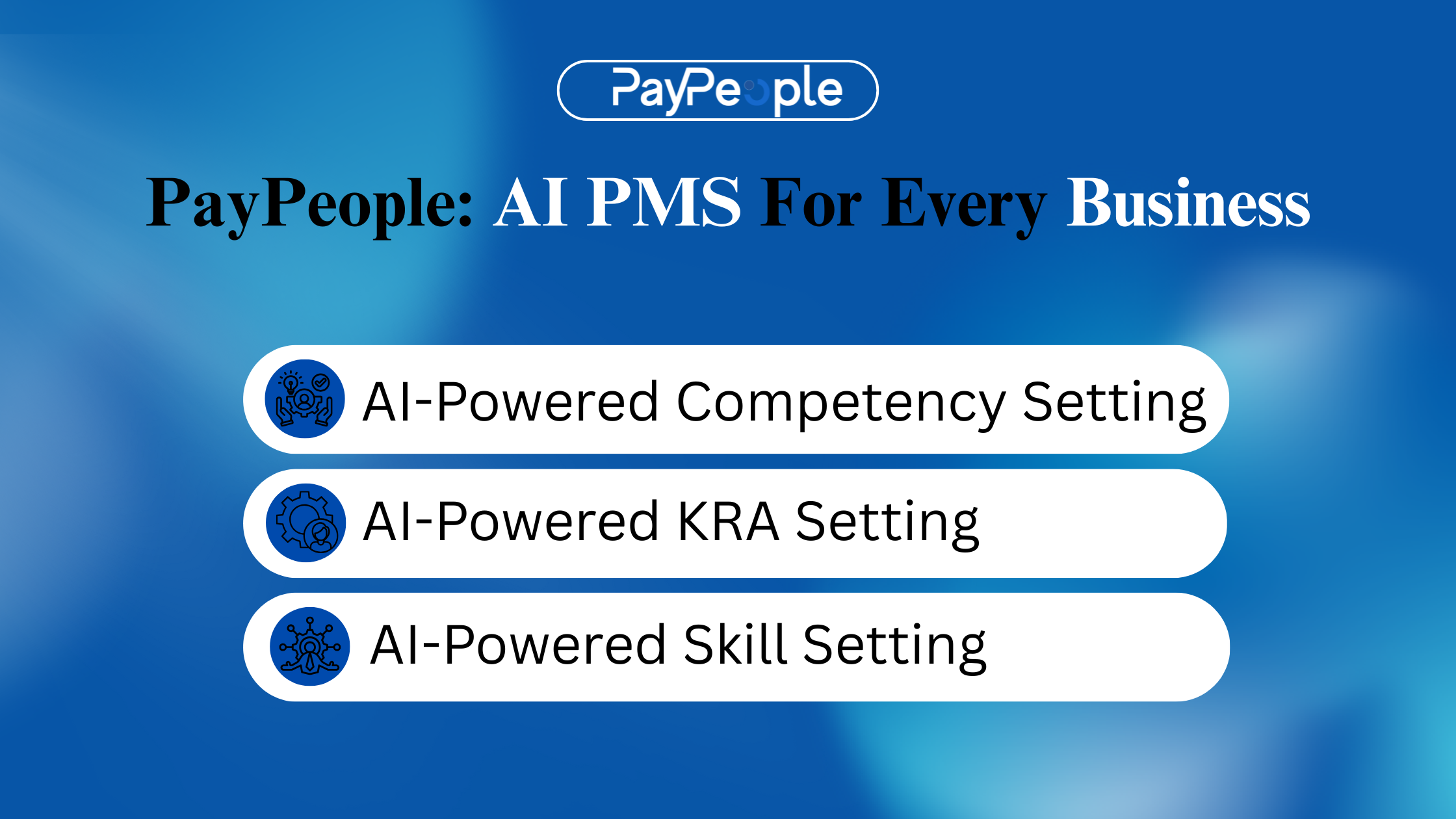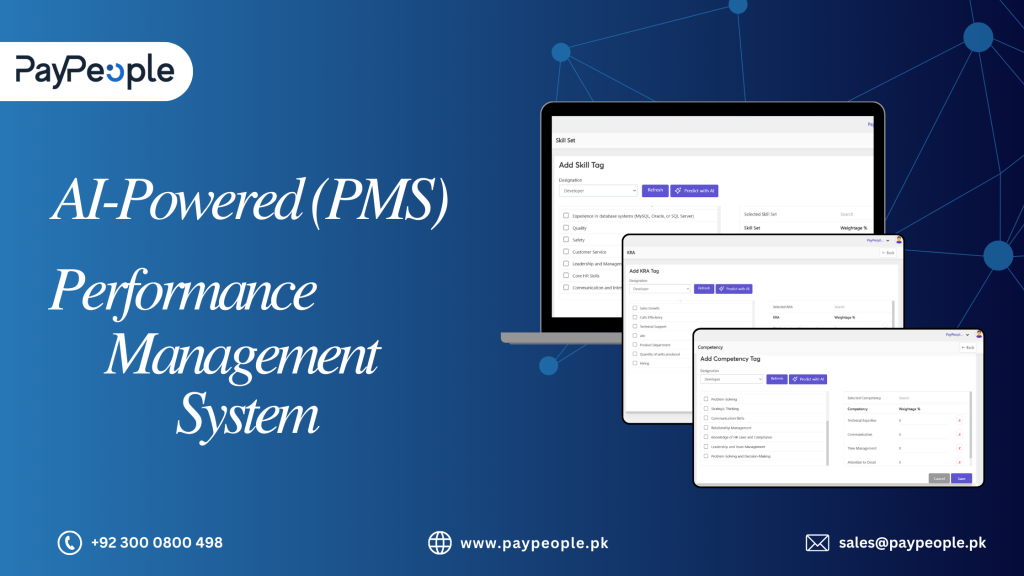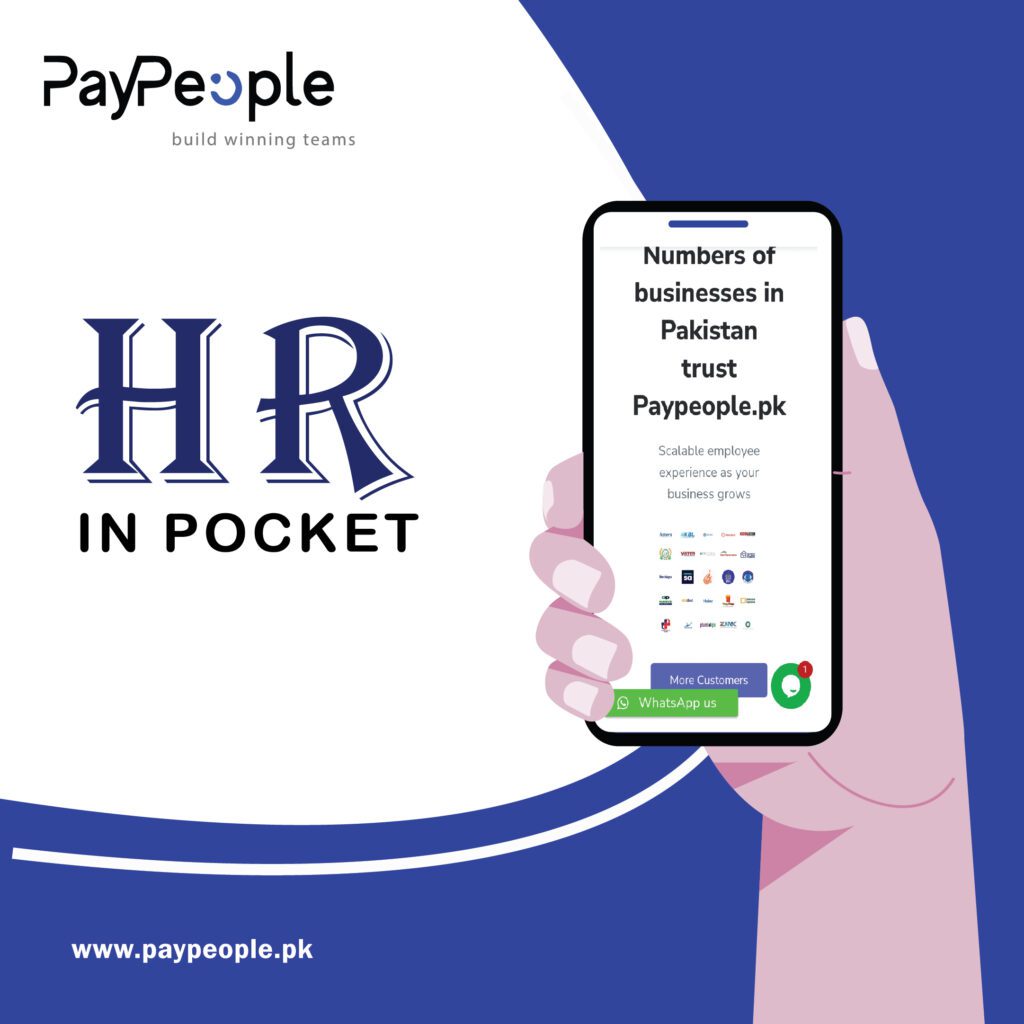Introduction
In the dynamic and rapidly evolving world of human resource management, a Performance Management System (PMS) has become an indispensable tool for modern organisations. As businesses strive for higher productivity, better employee engagement, and strategic alignment, PMS platforms offer structured solutions to track, evaluate, and enhance employee performance. The demand for data-driven performance evaluation tools has surged, particularly with the growing integration of artificial intelligence in workplace operations.
For companies aiming to gain a competitive edge, adopting a sophisticated PMS is no longer optional—it is a strategic necessity. Solutions like PayPeople, a comprehensive HR software platform, are empowering businesses to adopt AI-powered performance management for precise goal-setting, seamless reviews, and continuous feedback.
What is a Performance Management System?
A Performance Management System is a structured software solution that facilitates the monitoring, assessment, and improvement of employee performance within an organisation. Unlike traditional annual reviews, a PMS supports continuous evaluation, goal alignment, and ongoing feedback.
At its core, a PMS helps organisations ensure that every employee’s efforts are aligned with broader business objectives. Through features like key performance indicators (KPIs), real-time tracking, and performance metrics, it enables managers and HR professionals to make informed decisions. The ultimate purpose of a PMS is to cultivate a high-performing workforce that contributes to organisational growth while fostering a culture of accountability, recognition, and development.
Key Features of a Modern PMS
Modern performance management systems have evolved to offer a range of intelligent and adaptive features. These capabilities help HR departments and managers stay agile and responsive to workforce dynamics.
Goal Setting and Alignment
A robust PMS allows for the creation of SMART goals that are measurable, achievable, and aligned with organisational objectives. This ensures every team member is working towards a shared vision.
Continuous Performance Tracking
Instead of waiting for annual reviews, performance can be monitored continuously. This provides an accurate picture of progress and helps identify issues early.
360-Degree Feedback
Employees receive feedback from peers, managers, and subordinates, offering a holistic view of their performance. This multi-source approach enhances fairness and reduces biases.
Self-Assessment and Manager Review
Self-evaluation empowers employees to reflect on their own progress, while manager reviews offer critical insight and direction for future improvement.
AI-powered analytics and Insights
Artificial intelligence analyses employee data to provide actionable insights, identify trends, and suggest improvements. This predictive capacity makes the system more proactive than reactive.
Integration with Payroll or HR Software
A PMS that seamlessly integrates with existing HR tools—such as payroll, attendance, or leave management—streamlines operations and eliminates redundant data entry.
Benefits of Implementing a PMS
Adopting a performance management system presents numerous organisational benefits, ranging from increased productivity to enhanced employee engagement.
Enhanced Employee Productivity
When performance is tracked consistently and goals are communicated, employees are more likely to remain focused and deliver optimal results.
Transparent Performance Evaluation
A structured PMS reduces ambiguity in performance assessments. Clear metrics and documentation foster fairness and build trust among employees.
Improved Goal Clarity
With systematic goal-setting features, employees are more aware of what is expected of them, reducing confusion and enhancing motivation.
Reduced Bias in Reviews
By incorporating data from various sources and using objective metrics, PMS platforms help eliminate subjectivity from performance evaluations.
Real-Time Feedback and Coaching
Frequent feedback allows employees to course-correct in real-time, leading to better outcomes and continuous development.
Better Employee Retention and Satisfaction
When employees feel acknowledged and supported through regular feedback and development plans, their job satisfaction and loyalty significantly improve.
How AI is Transforming Performance Management
Artificial Intelligence has introduced a paradigm shift in how performance management is approached in the digital era.
Predictive Performance Analytics
AI-powered tools can forecast employee performance based on historical data, enabling proactive intervention for underperformance or recognition of excellence.
Personalized Employee Insights
AI algorithms analyze employee behavior and output to deliver personalized coaching and development suggestions tailored to individual strengths and areas for growth.
Automating Routine Evaluation Processes
Administrative tasks such as scheduling reviews, sending reminders, and compiling performance reports are automated, allowing HR teams to focus on strategic initiatives.
Identifying High Performers and Potential Risks Early
With intelligent analytics, organizations can identify employees with leadership potential or those at risk of disengagement or turnover, allowing for timely action.
Encouraging Data-Driven Decision-Making
The integration of AI encourages the use of real-time, data-based insights rather than relying on subjective impressions or delayed feedback.
Industry Use Cases
Numerous industries across Pakistan and beyond have embraced AI-powered performance management systems to improve operational efficiency.
In the IT sector, companies use PMS tools to manage rapidly growing teams and ensure performance targets are met across agile workflows. Banks benefit from transparent evaluation mechanisms, reducing compliance risk. In the manufacturing sector, PMS helps track shift-based employee performance and aligns production targets with workforce planning.
Why Choose PayPeople’s PMS?
PayPeople offers a next-generation Performance Management System designed to meet the evolving needs of businesses in 2025 and beyond. It combines intelligent design with user-centric functionality to deliver an unparalleled HR experience.
Unique Features of PayPeople’s PMS:
-
Real-Time Performance Dashboards: Gain immediate insight into individual and team performance.
-
AI-Powered Feedback Mechanisms: Receive predictive performance suggestions and coaching tips.
-
Integration with Payroll and HR Modules: Sync performance outcomes with promotions, bonuses, and compensation.
-
User-Friendly Interface: Both HR teams and employees benefit from an intuitive platform that simplifies evaluations, feedback, and goal tracking.
PayPeople’s solution is especially valuable for organizations seeking seamless collaboration between different HR processes, supported by AI analytics for accurate decision-making.
Conclusion
In today’s fast-paced corporate environment, investing in an intelligent Performance Management System is critical to ensuring long-term success. From real-time feedback to predictive analytics, PMS platforms offer a comprehensive solution to align employee potential with business objectives.
As workforce expectations evolve and businesses strive for continuous improvement, tools like PayPeople’s PMS empower organizations to remain competitive, motivated, and goal-oriented.
You can also read our other blogs like:
- Top Features to Look for in Payroll Software – PayPeople
- Why Businesses Need HR Software for Efficiency
- PayPeople: AI-powered Performance Management System (PMS)
Schedule a demo with PayPeople today and experience the future of performance management.
